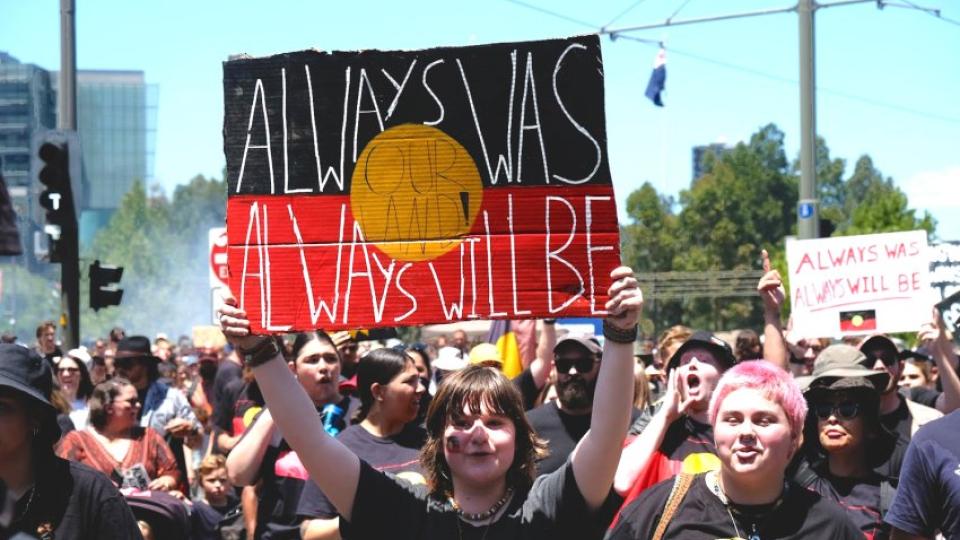After the referendum: Continue the struggle for justice

Socialist Alliance recommends a Yes vote for the referendum on the Voice. But we also recognise that substantial measures to benefit Indigenous people require a strengthening of the grassroots movements for change. This will be true whatever the outcome on October 14.
We also have to squarely face the fact that the official Yes campaign is fraught with contradictions because it rests on two fundamentally counterposed objectives. These are the two souls of the Voice — one based on genuine hope, the other on shrewd cynicism.
A majority of Indigenous people welcome the Voice as a modest step forward or, at the very least, a better outcome than a victory for No. Likewise, many non-Indigenous people, particularly the young, will vote Yes as a genuine expression of their support for Indigenous Australians, and their disgust with the crass racism of the official No campaign.
At the same time, the Yes campaign is supported by 14 of the country’s top 20 companies — including Rio Tinto and BHP — and business organisations like the Business Council of Australia and the Minerals Council of Australia.
How can we explain such a strange situation?
Attitudes about our history are changing, particularly among young people who recognise that Australia was founded on violent dispossession; it continues to shape the lives of Indigenous people today and it is absurd and immoral to pretend otherwise.
For many people in their 20s, this is the moral issue of our time, in the way that the war in Vietnam was for their grandparents’ generation.
A manifestation of this shift has been the debate in recent years about Australia Day and the surging attendance by young people at Invasion Day rallies
This is putting pressure on the corporate elite and their servants in parliament. Only seven years ago, mining industry mouthpiece The West Australian was ferociously defending Australia Day, but has now joined the chorus calling to “change the date”.
For them, symbolic change is ok if it delays discussion about more fundamental questions. They certainly don’t want a debate about Sovereignty or Treaty leading to real land rights, or anything else that would threaten free rein for the mining companies.
For its part, the Anthony Albanese Labor government desperately needs an historic reform to mark out its progressive credentials, but one that doesn’t actually threaten corporate profits. All the more so, because it needs to distract us from its woeful response to the climate emergency, the billions to be squandered on the Australia-Britain-United States security pact (AUKUS) and its refusal to confront the housing affordability crisis.
However, there have been two consequences of this safe and cynical approach that have rebounded on Albanese and the Yes campaign.
First, it has divided Indigenous opinion, with a small but important minority of militant Aboriginal activists rejecting the Voice as impotent symbolism when the Federal government won’t commit to implementing all the recommendations of the Royal Commission into Aboriginal Deaths in Custody and the Bringing Them Home report.
Secondly, the messaging has been contradictory, as Albanese tries to have it both ways. To more progressive-minded people, the Voice is pitched as “a once-in-a-lifetime opportunity for epic change”, while more conservative voters and big business are assured that it is “nothing more than a powerless advisory body”.
Not surprisingly, this is confusing for many, generating suspicions that the No campaign has seized upon. Add to this, a section of Australian big business has decided to fund the official No campaign, meaning the racist right-wing elements at its centre are getting lots of space to spread their toxic talking points and mobilise their base.
But if much of corporate Australia hopes that the Voice will contain and constrain real change, why does the Coalition oppose it?
This is not just short-term point-scoring by opposition leader Peter Dutton, or a desire to play to the Coalition’s more hard-core racist base — although those things are part of the picture. He simply doesn’t want a national representative Indigenous body — no matter how restricted and advisory in nature — to have the kind of authority in public opinion that would make a future federal government look bad if it completely ignored its recommendations.
We can't assume that the Voice would always — and in all circumstances — act as a bureaucratic handbrake. If there is a surge in grassroots activity, it may have the potential to cohere and amplify the voices of Indigenous people.
This is one of the reasons John Howard abolished the Aboriginal and Torres Strait Islander Commission (ATSIC), and why Tony Abbott went for a hand-picked body that would agree with whatever he said. While ATSIC couldn't make the federal government do anything, it could still call it out for ignoring Indigenous opinion. Dutton doesn't need to take that risk, unlike Albanese who has to because he needs to throw some crumbs to progressive opinion.
While many people are voting Yes because they want it to be a stepping stone towards greater things, the corporate supporters of both the official Yes and the official No campaigns are trying to block the impetus for change.
The extent to which either of these two things comes to pass will be determined by grassroots struggle, regardless of the outcome of the referendum.
[Sam Wainwright is a national co-convenor of the Socialist Alliance.]